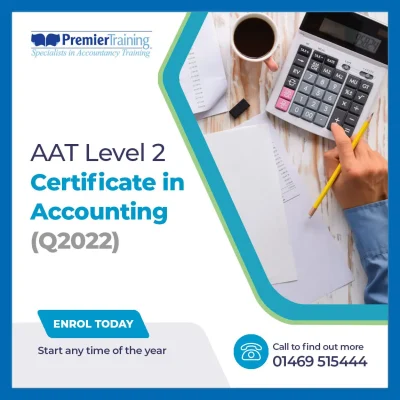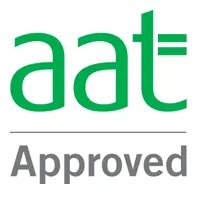I’ve finished the AAT Level 1 Award in Bookkeeping course and am very impressed!
I have just finished the AAT Level 1 Award in Bookkeeping and I am very impressed with the quality of…
 AAT Bookkeeping Bundles
AAT Bookkeeping Bundles ICB Courses
ICB Courses
The AAT Level 2 Certificate in Accounting is ideal for anyone wishing to study accountancy and finance alongside a range of complementary business and personal skills.


Contact us to discuss an affordable payment plan to suit you
The AAT Level 2 Certificate in Accounting is ideal for anyone wishing to study accountancy and finance alongside a range of complementary business and personal skills.
The purpose of the AAT Level 2 Certificate in Accounting (previously known as the “AAT Foundation Certificate in Accounting”) is to offer the foundation accounting knowledge needed to progress to employment or further study in accountancy and finance, alongside business and personal skills that are transferable to any sector and additional business knowledge relevant to accountancy.
The qualification offers a broader focus across several subject areas which enhances employability.
Visit the AAT here for more information
Included Key Features
Start your studies the same day
Instant access to tutor support
Award winning learning resources
Hardcopy books, eBooks and Audiobooks included
Pay by instalments (interest free)
24 hour online access
On-demand tutor support via email, telephone, zoom
Prompt marking turnaround – marked by a tutor (not a computer)
Pass Promise
Exclusive £200 discount AAT Level 2 Certificate in Accounting (Q2022) Course
Including hard copy materials £829 £629
Exclusive £200 discount AAT Level 2 Certificate in Accounting (Q2022) Course
Online Resources with Tutor Support (No hard copy materials) £699 £499
Please use this form to send us an enquiry about the AAT level 2 certificate in accounting course, distance learning / home study or additional information. We will respond as soon as possible.
If you have work experience or qualifications within manual bookkeeping there may an option to claim exemption from the AAT Level 2 Certificate in Accounting and start at AAT Level 3 Advanced Diploma in Accounting.
The skills check has questions that are designed to help the tutor’s at Premier Training assess and advise which is the most suitable level for you to start at. If you wish to take the test, please complete then click submit.
The initial assessment quiz is then automatically emailed to a Premier Training tutor for prompt marking and a Premier Training course advisor will contact you with your result.
To see if you are exempt, click below to access our online AAT courses skills check.


 In this AAT level 2 online course you can browse our new course materials for the AAT Q2022 syllabus.
In this AAT level 2 online course you can browse our new course materials for the AAT Q2022 syllabus.
This e-learning software will allow you to study and revise for your final assessment efficiently in a structured format. Your personal timetable sets the pace of your course informing you which assignment and assessment needs to be completed by its assigned date.
To prepare you for the final assessment each unit contains three assignments and a mock assessment. Between each assignment are study resources such as chapters from study books, videos, quizzes and help sheets which allow you to gain the relevant knowledge to complete the online assignments.

Students should choose the AAT Level 2 Certificate in Accounting (Q2022) if they’re interested in developing transferable business and personal skills alongside their core accountancy skills. This qualification may also be valuable for those entering the workplace for the first time or for those changing careers who would like additional support in upskilling to enter, or re-enter, a business environment.
Entry Requirements
There are no entry requirements for the AAT Level 2 Certificate in Accounting (Q2022) course.
In developing this qualification, AAT has carried out extensive consultation with and received input from a wide variety of stakeholders, including industry experts, employers and training providers. AAT qualifications benefit from being globally recognised and they’re valued by leading employers, from small high street firms to large accountancy businesses. They offer students flexible study options, with over 500 AAT Approved training providers around the world.
The Level 2 Certificate in Accounting covers a broad range of core accounting skills, as well as accountancy-related business skills and personal skills.
Key themes have also been introduced throughout the suite of accounting qualifications, including technology, ethics, sustainability and communication.
This qualification comprises four mandatory units (255 guided learning hours in total):
Working in accountancy requires good communication skills, information technology (IT) skills and an understanding of the business environment, as well as an understanding of daily finance/accounting functions. The purpose of this qualification is to ensure that students are well rounded and well prepared to progress into a career in business, finance or professional accountancy, or into further education.
A student completing this qualification will develop accountancy skills in double-entry bookkeeping and basic costing, as well as an understanding of purchase, sales and general ledgers. Students will learn an understanding of accounting software and develop the professional skills and behaviours needed to contribute effectively in the workplace.
The qualification develops additional business skills that have particular relevance to those working in accountancy, finance and general business roles.
Students are introduced to elements of commercial law that might have an impact on them when working in accountancy, such as contract law, employment law and company law. In addition, students will further develop their business communication and personal skills and will learn how to manage their personal and professional development through lifelong learning.
Three units are assessed individually in end-of-unit assessments. This qualification also includes a synoptic assessment that draws on and assesses knowledge and understanding from across a number of units.

You will be allocated a personal AAT tutor who will guide you throughout the course.
We have a team of tutors who are here to help and if your personal tutor is not available they will be happy to help and keep the marking turnaround prompt. They are qualified, experienced, patient and effective communicators so you will find that you will build a good student/teacher relationship with them all.
When studying with us you will find the staff friendly and helpful with a great support network for students. You will receive constructive feedback, guidance and support. You will also receive a personal timetable to follow which structures your whole coursework for you which can be flexible to suit your pace of study.
Additionally, you are also provided with a personal course advisor who has great knowledge of the AAT qualified who can offer advice on how to manage your AAT course studies along with work, family and other commitments.
Our tutors are very accessible! The office is open at the following times:
Mondays 9am – 8pm
Tuesdays 9am – 8pm
Wednesdays 9am – 8pm
Thursdays 9am – 8pm
Fridays 9am – 5pm
Saturdays 9am – 12pm
Course Content
Throughout your online learning journey, you’ll be presented with study resources tailored to the topics covered in each unit, such as chapters from the study manuals, revision videos, quizzes and help sheets. At regular intervals you’ll be presented with an assignment, or practice assessment, to complete and submit to your tutor for marking.
Course progress is automatically saved in ‘the cloud’, meaning you can resume your learning exactly where you left off in each unit by logging into your My Premier Training Account (MyPTA) account from any device connected to the internet. Additionally, if you don’t have time to complete a piece of coursework in one sitting, you can save your progress, and again, resume it from any location or device.
The accountancy and business skills developed by studying this qualification will enable a student to seek employment with confidence and/or to progress to the next level of learning. A student completing this qualification will develop skills in double-entry bookkeeping and will understand how to use journals, control accounts and a trial balance.
Students will also gain an understanding of accounting software packages, how to process financial information in accordance with company procedures and schedules, and how to provide information to colleagues, suppliers and/or customers as required.
Career Prospects – Skills developed through this qualification could lead to employment as:
The accountancy and finance knowledge developed in this qualification is also the underpinning knowledge needed for the higher-level accountancy and financial skills developed in the Level 3 Diploma in Accounting and the Level 4 Diploma in Professional Accounting. For example, double-entry bookkeeping at Level 2 is the basis for Financial Accounting: Preparing Financial Statements (Level 3), which leads on to Drafting and Interpreting Financial Statements (Level 4).
Course Fees
AAT Level 2 Certificate in Accounting (Q2022) – Including hard copy materials Was £829 Now £629
AAT Level 2 Certificate in Accounting (Q2022) – Online Resources and Tutor Support (No hard copy materials) £499
Postage & Packaging (Monday to Friday Delivery) £17
Postage & Packaging (Saturday Delivery) £28
Postage & Packaging Overseas £49
*Please note the overseas P&P of £49 is an estimate and we will confirm the final amount of P&P due when the delivery address has been confirmed. The AAT course fee and P&P can be paid by monthly instalments at no extra charge and the first instalment will get you started immediately (UK students only).
Additional fees to remember
Please note: In order to achieve the AAT qualification, you will need to join the AAT as a student member. The following items are not included in your course fees:
AAT Membership Fee £175
Examination fees*:
AAT Foundation Certificate in Accounting Fees vary between approximately £100 and £120 per exam
*Exam fees vary depending on the exam center.
Introduction to Bookkeeping (ITBK) Unit
This unit provides students with an understanding of manual and digital bookkeeping systems, including the associated documents and processes. Students will learn the basic principles that underpin the double-entry bookkeeping system and will learn that digital accounting systems are automating some of the stages in the process.
Students will learn how to check the accuracy of invoices, credit notes, remittance advices, statements of account and petty cash vouchers. They will know how to use these documents to make entries in sales and purchases daybooks, sales and purchases returns daybooks, and discounts allowed and received daybooks using account codes, as well as how to transfer those totals to the sales, purchases and general ledgers.
They will learn that entering these into a digital bookkeeping system is the same process as entering the transactions manually, although the way they are entered will vary from system to system.
The United Kingdom (UK) government department responsible for collecting taxes, HM Revenue & Customs (HMRC), offers more than one method of accounting treatment when prompt payment discount (PPD) is allowed and received. However, students at this level are only required to use credit notes to adjust for PPD.
Using this approach, credit notes are recorded in separate daybooks, a discounts allowed daybook and/or a discounts received daybook, which removes the need for discount columns in the cash book. There is no requirement at this level for students to understand how to account for PPD by any other method.
This unit refers to value added tax or VAT. This is an indirect tax operating in the UK, but this type of tax may also operate and be known by another name in other countries.
The cash book and petty cash book are also covered in this unit, including making entries into both and transferring totals to the ledgers. Students will learn that entering transactions into the cash book of a digital bookkeeping system serves the same purpose as entering the transactions into a manual bookkeeping system.
Students will make appropriate checks on the accuracy of supplier invoices and credit notes, reconcile supplier statements with the purchases ledger account and calculate payments due to suppliers.
They will also calculate sales invoice and credit note amounts and check receipts from customers. Students will have learnt all stages necessary to process transactions using both manual and digital systems.
Reference to digital systems includes applications as well as both desktop and cloud accounting software.
Learning outcomes:
Principles of Bookkeeping Controls (POBC) Unit
This unit builds on the knowledge and skills acquired from studying Introduction to Bookkeeping and explores control accounts, journals and reconciliations. It takes students through a number of processes used in bookkeeping that help verify and validate the entries made. These processes enable the student to understand the purpose of control accounts and associated reconciliations. Students will also understand the use of the journal to the stage of redrafting the trial balance, following initial adjustments.
This unit covers procedures that are required to ensure bookkeeping is completed beyond purely entering or processing initial transactions, which will enable students to develop their understanding of the relationship between the various accounting records and consolidate their knowledge of double-entry bookkeeping.
Students will develop the ability to prepare the value added tax (VAT) control account as well as the receivables and payables ledger control accounts, including reconciliation with the receivables and payables ledgers. They will use the journal to record a variety of transactions, including the correction of errors. Students will be able to redraft the initial trial balance, following adjustments. They will learn to update the cash book following receipt of a bank statement, and also how to prepare a bank reconciliation statement.
This unit explores the knowledge required to complete these bookkeeping procedures both manually and digitally. While the student will not be expected to demonstrate the ability to use any specific accounting software, the unit will explain to them where digital accounting systems are automating processes they are learning. The skills and knowledge gained will enable students to understand the business environment and facilitate their comprehension of a digital accounting system.
Reference to digital systems includes applications as well as both desktop and cloud accounting software.
Learning outcomes:
Principles of Costing (PCTN) Unit
This unit gives students an introduction to the principles of basic costing and builds a solid foundation in the knowledge and skills required for more complex costing and management accounting. Students will learn the importance of the costing system as a source of information that allows management to plan, make decisions and control costs. Students should recognise the key differences from a business perspective between costing and financial accounting.
Students will learn a range of techniques to cost materials, labour and overheads to establish the unit cost of a product or service, and this will include understanding and applying codes. Students will learn how to classify costs and will understand how different classifications of cost can be used for internal management decision making. Students will understand how cost behaves at different levels of output, and how variable and fixed costs per unit behave as output changes. Students will learn to build a basic unit product cost using labour hours, machine hours and per unit as a basis.
This will prepare students and give them the basic tools for studies in overhead apportionment, reapportionment and absorption in later units. They will learn that overhead is a large, and in many cases the largest, component of cost.
The budgetary control system is introduced, and by comparing actual costs with budgeted costs for a single product and using a fixed budget, students will determine variances, noting whether they are adverse or favourable and reporting to management on their causes and effects.
Learning the tools and techniques that can be used to support the calculation of costs will allow students to recognise that cost calculations can be prepared more quickly and accurately than manual calculations.
Learning outcomes
The Business Environment (BENV) Unit
The business environment is dynamic and is changing considerably as the digital age progresses to facilitate the global nature of business. It is essential that students are aware of the impact that this environment has on organisations, from sole traders to large companies operating in local, national and global markets, and that they are equipped with the knowledge and skills to enable them to work effectively.
This unit provides knowledge and understanding of key business concepts and their practical application in the external and internal environment in which students will work. Students will gain an understanding of the legal system and principles of contract law and an appreciation of the legal implications of setting up a business and the consequences this may have. Wider issues impacting businesses will be considered, including the global economic environment in which it operates, how governments impact upon it and the competitive nature of the global economy.
Students will learn how organisations are structured and where the finance function fits within this. They will recognise that the role of the finance function has changed considerably due to the impact of new technologies. Although many of the activities remain similar, their scope and nature reach beyond the traditional boundaries of the finance function.
This unit will prepare students for the current workplace and help them recognise the importance of working effectively, whilst acknowledging the value of differences and being sensitive to the needs of others. They will gain an appreciation of communication methods and learn how to recognise valid sources of information.
They will develop skills in using data analytic technology to solve problems, analyse data and communicate effectively.
Ethics and sustainability are key themes embedded throughout this unit. Students will recognise the importance of ethics in business and how sustainable business is important for future business success.
Learning outcomes
I have just finished the AAT Level 1 Award in Bookkeeping and I am very impressed with the quality of…
The tutors are super friendly and happy to answer any questions – they’re always quick to reply too. Results come…
I have just passed my second AAT assessment and I’m very happy and grateful to Premier Training for the help…
I’m really happy with everything – great printed materials that worked well combined with really good online resources that I…
Many thanks to Premier Training for the great opportunity for online studying! I am happy with all the learning materials…
I would highly recommend Premier Training. The course materials, tutor support and exam prep was invaluable. Thank you for helping…
From the first moment I contacted Premier Training to assist with my qualifications I have received outstanding tailored support in…
I have successfully completed all three AAT Levels in just over three years with the help of the team at…
